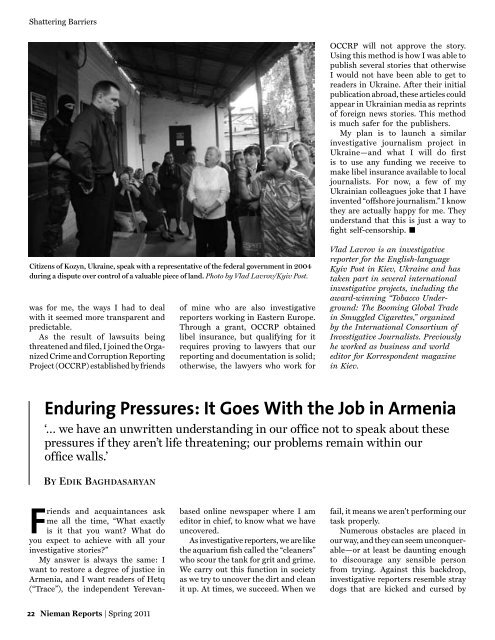N ieman Reports - Nieman Foundation - Harvard University
N ieman Reports - Nieman Foundation - Harvard University
N ieman Reports - Nieman Foundation - Harvard University
You also want an ePaper? Increase the reach of your titles
YUMPU automatically turns print PDFs into web optimized ePapers that Google loves.
Shattering Barriers<br />
OCCRP will not approve the story.<br />
Using this method is how I was able to<br />
publish several stories that otherwise<br />
I would not have been able to get to<br />
readers in Ukraine. After their initial<br />
publication abroad, these articles could<br />
appear in Ukrainian media as reprints<br />
of foreign news stories. This method<br />
is much safer for the publishers.<br />
My plan is to launch a similar<br />
investigative journalism project in<br />
Ukraine—and what I will do first<br />
is to use any funding we receive to<br />
make libel insurance available to local<br />
journalists. For now, a few of my<br />
Ukrainian colleagues joke that I have<br />
invented “offshore journalism.” I know<br />
they are actually happy for me. They<br />
understand that this is just a way to<br />
fight self-censorship. <br />
Citizens of Kozyn, Ukraine, speak with a representative of the federal government in 2004<br />
during a dispute over control of a valuable piece of land. Photo by Vlad Lavrov/Kyiv Post.<br />
was for me, the ways I had to deal<br />
with it seemed more transparent and<br />
predictable.<br />
As the result of lawsuits being<br />
threatened and filed, I joined the Organized<br />
Crime and Corruption Reporting<br />
Project (OCCRP) established by friends<br />
of mine who are also investigative<br />
reporters working in Eastern Europe.<br />
Through a grant, OCCRP obtained<br />
libel insurance, but qualifying for it<br />
requires proving to lawyers that our<br />
reporting and documentation is solid;<br />
otherwise, the lawyers who work for<br />
Vlad Lavrov is an investigative<br />
reporter for the English-language<br />
Kyiv Post in Kiev, Ukraine and has<br />
taken part in several international<br />
investigative projects, including the<br />
award-winning “Tobacco Underground:<br />
The Booming Global Trade<br />
in Smuggled Cigarettes,” organized<br />
by the International Consortium of<br />
Investigative Journalists. Previously<br />
he worked as business and world<br />
editor for Korrespondent magazine<br />
in Kiev.<br />
Enduring Pressures: It Goes With the Job in Armenia<br />
‘… we have an unwritten understanding in our office not to speak about these<br />
pressures if they aren’t life threatening; our problems remain within our<br />
office walls.’<br />
BY EDIK BAGHDASARYAN<br />
Friends and acquaintances ask<br />
me all the time, “What exactly<br />
is it that you want? What do<br />
you expect to achieve with all your<br />
investigative stories?”<br />
My answer is always the same: I<br />
want to restore a degree of justice in<br />
Armenia, and I want readers of Hetq<br />
(“Trace”), the independent Yerevanbased<br />
online newspaper where I am<br />
editor in chief, to know what we have<br />
uncovered.<br />
As investigative reporters, we are like<br />
the aquarium fish called the “cleaners”<br />
who scour the tank for grit and grime.<br />
We carry out this function in society<br />
as we try to uncover the dirt and clean<br />
it up. At times, we succeed. When we<br />
fail, it means we aren’t performing our<br />
task properly.<br />
Numerous obstacles are placed in<br />
our way, and they can seem unconquerable—or<br />
at least be daunting enough<br />
to discourage any sensible person<br />
from trying. Against this backdrop,<br />
investigative reporters resemble stray<br />
dogs that are kicked and cursed by<br />
22 N<strong>ieman</strong> <strong>Reports</strong> | Spring 2011

















